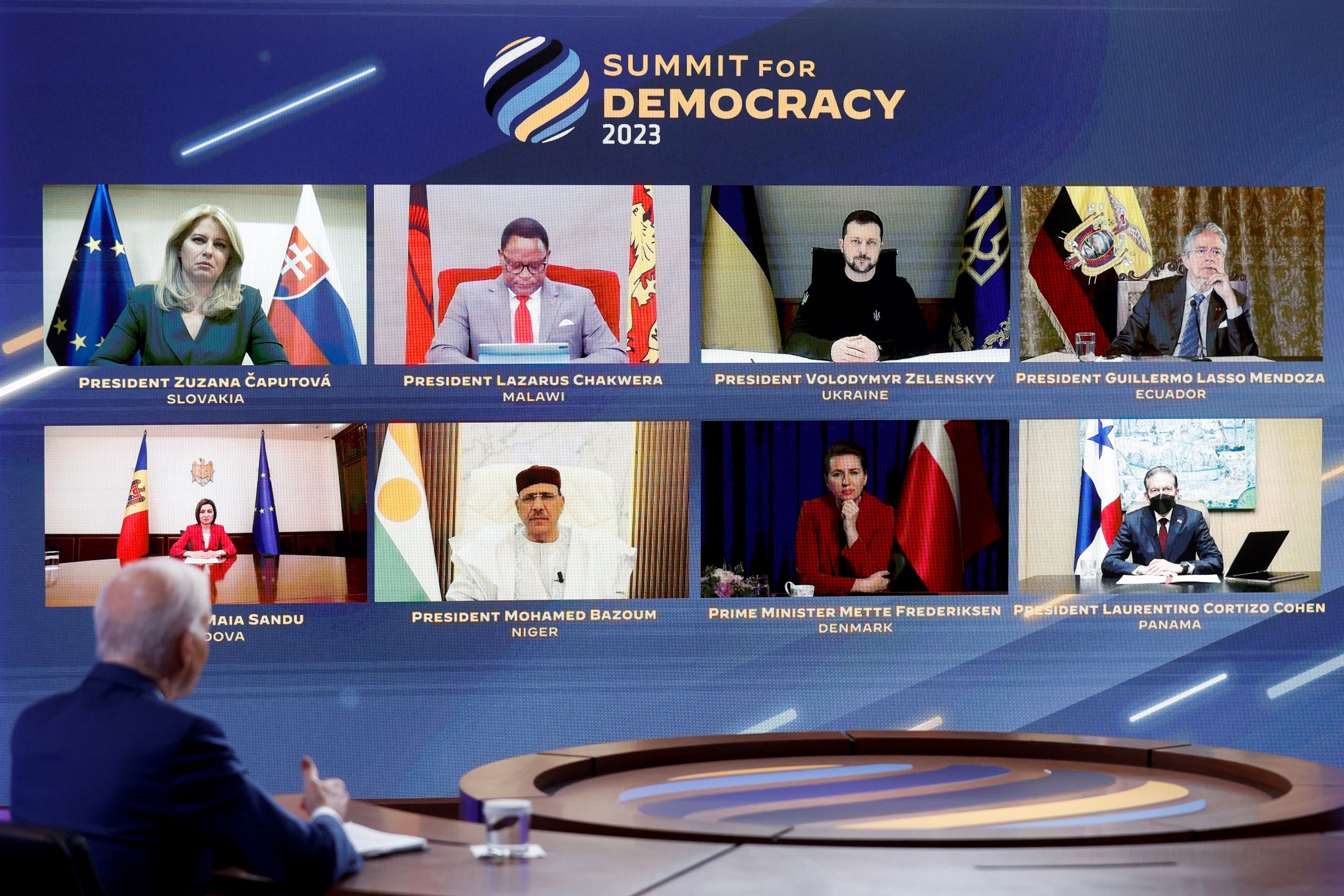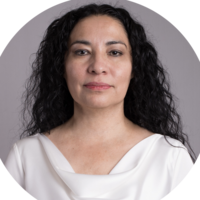Amid a backdrop of global democratic backsliding and Russia’s invasion of Ukraine, the United States, Costa Rica, Netherlands, South Korea, and Zambia cohosted the second Summit for Democracy on March 29 and 30. Although the summit addressed some of the problems of the first summit in December 2021—including the cohosting format and more concrete recommendations—Five experts writing for this Council of Councils global perspective series say that future summits need to be more inclusive and have more moral, political, and economic value if the summit is to have lasting significance in a crowded global agenda.

The Summit Needs Formal Commitments to Have Staying Power
President Joe Biden convened the first Summit for Democracy in late 2021 to initiate a global conversation and commitment to democracy. This past week he convened the second. The first effort never generated the international or even domestic attention it deserved. The second addressed some of the problems of the first, but not all. Themes were better rooted in concrete, fundamental challenges to democracy and the conveners were more diverse. As a result, the discussion and recommendations were more concrete.
This, though, is probably not enough to make a democracy summit an institutionalized global phenomenon along the lines of, say, the Group of Twenty.
Part of the failure of the 2021 summit was that it was exclusively virtual, necessary because of COVID-19. Another is that it was chaired only by the United States. World leaders and scholars virtually talking to each other simply cannot produce the effect of the standard summit with pictures of elected heads of government standing together in the name of democracy.
This summit was hybrid, and hosted by convening governments in Costa Rica, the Netherlands, South Korea, and Zambia. So, better photo ops.
Improving on the first summit, though, requires more than moving beyond Zoom meetings. Much depends on an honest reflection of the economic, social, and political challenges within countries, which was lacking in the 2021 agenda. These challenges, which developed and developing countries share, stem from economic insecurity, polarization, nationalist populism, and declining faith in institutions that have weakened social and political commitments to the rule of law and the soft norms of community, tolerance, and debate.
This year’s agenda was a significant improvement from 2021’s platitudes and warmed-over recommendations on anticorruption and civic education. Its sessions were dedicated, for example, to social inclusion and prosperity and the roots of declining popular and political faith in democracy. At the same time, commitments on banning or monitoring surveillance technology and improved democratic regulation of social media could address the concrete tools—though not the roots—of populist, autocratic government in places such as Hungary, Israel, Mexico, Turkey, and Venezuela. Public commitments to regulate the sale and use of surveillance technology with penalties for private-sector companies that willfully transfer technology and enable malign actors should be a next step.
South Korea is slated to host the next summit. Whether a potentially important initiative has legs will depend on whether the invitation has moral and political and economic value. This value could include expanded economic and development support for struggling democracies and fraying social safety nets. A future summit needs also to highlight and commit participants to calling out and reacting to what has become the standard playbook of elected autocrats the world over, stoking polarization and hate speech, undermining electoral integrity, demonizing political and civic opposition, and attacking freedom of expression—patterns that should be familiar to Americans who support democracy. Until the summits do this, these semi-regular meetings (whether virtual or in person) risk becoming an empty exercise of bland commitments and declining attraction among a predetermined choir.
Expand Global Actors in Democracy Initiatives
Four democracies in various regions across the world cohosted the second Summit for Democracy with the United States last week, each focusing on a separate so-called pillar of democracy. The cohosting format improved on the first summit and greatly contributed to the shared leadership efforts of the second.
South Korea hosted the Indo-Pacific regional conference and focused on an anticorruption agenda. Preventing and punishing corruption is important even for less democratized countries if their leaders care about development and legitimacy. Four related topics were discussed in Seoul: bolstering international cooperation on anticorruption, involving nongovernmental stakeholders in anticorruption, advancing technology and anticorruption, and promoting financial transparency and integrity. International and civil society organizations representatives from countries not invited to the summit were also given the opportunity to present their voices.
If the summit wants to be more than just another talk shop for international leaders, the process needs reform. First, all host countries of regional conferences should be given more proactive responsibility for invitations and initiatives. The consultation and coordination process among cohosting governments should also start earlier if the current format continues.
Second, more civil society participation from the Global South is greatly needed. Many civil society organizations and businesses created networks and cooperated during the Year of Action between the first and second summits. They were dominated, however, by Western organizations, primarily from Europe and the United States. Mechanisms that better integrate nongovernmental actors from Africa, Asia, and Latin America in the preparation process are needed.
Third, the summit needs to be more strategically integrated into the foreign policy of democratic countries. Without substantive programs that lend technological and financial support, the summit itself will not help the world make democratic progress.
The Summit for Democracy is the largest entity that includes most electoral and liberal democracies. To halt the influence of autocracies and assist democratic renewal efforts, democracies of the world should be united and work hard to have lasting effects.
Back to Basics: Peace and Security as Preconditions for Democracy
Skepticism seems to be the prevailing attitude surrounding the second Summit for Democracy. Many critics focused on how participant countries made only questionable progress on their commitments to build more resilient democracies, the participation of partly free and not free countries, and that the summit declaration was initially endorsed by only 73 of the 120 participants.
Yes, the results of the summit itself are modest—the most important outcome being the announcement of increased U.S. funding to fight corruption, support free and fair elections, and advance technologies that support democratic governments. The circumstances in which the summit took place are significant, however. History shows that peace almost always precedes democracy, and that states do not develop into true democracies as long as their citizens live in fear of violence. Existential security leads to support for democratic political organization, but insecurity can push people to embrace a nondemocratic path. The primary goal of democratic states today should therefore be to support nations that declare their commitment to democracy and their will to live in peace. This is especially true now, of course, for the Ukrainians who are fighting Russian aggression.
By supporting Ukraine, democratic countries are helping those who want the right to decide for themselves and to live in a democratic state free from outside interference. Getting this message across to other countries and their citizens—particularly in Africa, Asia, the Balkans, and Central and Eastern Europe—is vital to sustaining the attractiveness of a democratic model of governance. Such nations need to be sure that other democratic countries will not leave them behind if they pursue the path of peace, democracy, and prosperity, even against the pressure of more powerful autocracies.
Maintaining sanctions against Vladimir Putin’s regime in Russia also helps democracies worldwide by weakening one of the most important actors seeking to undermine them in recent years through election interference, cyberattacks, disinformation, and corruption. Sanctions also make it more difficult for Russia to directly support other authoritarian regimes, such as Iran, North Korea, or Syria, which in turn contribute to destabilizing their regions. As much as the United States has tried to support democracy around the world, Russia, with the help of China, has been trying to export destabilization and autocratic government for years, with some success. This should be stopped, and gatherings such as the Summit for Democracy have an important role to play.
Advancing the Summit’s Outcomes Beyond a Year of Action
The second Summit for Democracy was held at a precarious time. Since the first summit in December 2021, the world has grappled with the invasion of Ukraine, often described as a clash between democracy and authoritarianism. Such a characterization, though, distorts the reality of years of democratic backsliding and risks losing sight of the real issues.
It also overlooks the fact that many Global South democracies identified by the United States for inclusion in its summit have made a conscious choice to neither support nor condemn the war in Ukraine.
The hard truth is that trust in the democratic system is eroding. This has opened the door for populists and puts minority groups at risk of discrimination and exclusion from democratic and constitutional rights.
Successful and attempted unconstitutional changes of government have presented new challenges, especially in Africa, where the number of successful coups is rising.
The tendency to define democracy purely in electoral terms is also growing, a phenomenon present in donor relations in developing countries. This causes neglect of other aspects of democratic governance and threatens the quality of elections.
The first summit was criticized for being one-sided, pivoting around the United States and its geopolitical interests. Perhaps this motivated the U.S. decision to cohost the second summit with Costa Rica, the Netherlands, South Korea, and Zambia. Criticism of the summit, however, does not mean that the world’s democracies, including those in Africa, should not be concerned about the erosion of trust in the democratic system as one that can deliver economic, social, and political rights.
Although democracy is flawed, it is not doomed. Afrobarometer research shows that democracy remains the form of government most preferred by Africans. The same survey also shows that Africans value government accountability over efficiency.
The year between the two summits was labeled the Year of Action, a time states were expected to act on commitments made at the first summit to strengthen democracy, respect for human rights, and anticorruption mechanisms. Sixteen democracy cohorts of civil society and national government were created to support implementation of these commitments. Cohorts used the time to set clear objectives and guidelines, but more time is needed for measurable action. Sustaining democracy requires far more than one year of action.
The second summit risks being viewed purely as a foreign policy exercise rather than a forum designed to bring democracies together to actively address the domestic situations that need attention. The second summit did not part with this image in that many of the new initiatives center on U.S. foreign policy values. Sustaining democracy requires leaders to rebuild trust with their citizens in the ability of the system to be responsive to their concerns and for citizens to remain vigilant in calling for accountability.
A Global Pact for Democracy Is Needed
Democracy is in crisis. Democracy as an ideal type of political system implies that political representatives enjoy legitimacy to exercise power because they are elected by the free exercise of the political will of citizens, under established and accepted rules, and through institutions that guarantee transparency. The world, however, is now witnessing elected representatives who do not believe in the principles of democracy and who attack the entire democratic system.
These autocrats manage to take political power in already weakened democratic systems. The increase in poverty, political corruption and violence, and lack of access to justice are all factors that erode and divorce citizens from an ideal democracy. Due to these and other factors, millions of citizens feel excluded from their democratic systems. They need to feel included, identified, integrated, and excited by leaders who motivate them with hope yet represent only a shadow of democracy.
To face this crisis, it is essential that the Summit for Democracy becomes a permanent forum for democracies around the world and that its agreements and debates are disseminated as widely as possible: democratic principles must be known, demanded, and practiced daily by citizens so that representatives are accountable for their commitment to the common good. This accountability is nothing more than demanding that democracy serve to guarantee the rule of law and improve the living conditions of the vast majority of citizens.
However, in a globalized world, democracy cannot and does not endure in isolation. The summit needs to convene a large global and regional pact for democracy. All states should coordinate to address the problems that erode the sustainability of national democracies and the global democratic system. The origin of such problems are massive migration flows, the growth of criminal mafias, inequalities of all kinds, and the growth of various types of violence.











